|
|
|
Sort Order |
|
|
|
Items / Page
|
|
|
|
|
|
|
| Srl | Item |
| 1 |
ID:
188404
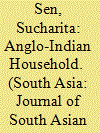

|
|
|
|
|
| Summary/Abstract |
This article subjects the personal narratives about the domestic spaces of expatriate Britons in India, or Anglo-Indians, to close scrutiny. The households of expatriate Britons were intended to mirror the racial distance of the formal imperial spaces, like clubs, parks and gymkhanas. But far from being an extension of public spaces that separated the colonised and the coloniser, the households embodied the multiplicity of social spaces. Interpersonal relations in these households complicated this bifurcation substantially. Space played a crucial role in the construction of a hierarchy–intimacy paradox in the households, where interracial intimacies existed in tandem with imperial hierarchies.
|
|
|
|
|
|
|
|
|
|
|
|
|
|
|
|
| 2 |
ID:
097665
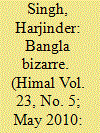

|
|
|
| 3 |
ID:
122995
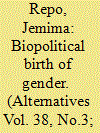

|
|
|
|
|
| Publication |
2013.
|
| Summary/Abstract |
This article argues that gender was invented in the 1950s as a new sexual apparatus of biopower. Through a reading of mid-century sexological studies against the background of structural-functionalist and behaviorist theories of social order, it shows how gender was born in the clinic to discipline the reproduction of life in new ways. The truth of sex was no longer found in the genitals or mind, but in the contingent cognitive processes of a behavioral control system. The gender apparatus produced systematized protocols for sex reassignment surgeries for infants with ambiguous genitalia and rendered the family a panoptic institution, all to ensure that children were socialized into normative gender roles guaranteeing the continued reproduction of the life of the species. The violence of this new life-administering technology was crystallized in the pedagogical techniques employed by physicians designed to persuade their child patients to submit themselves to the normalizing care of surgeons and psychiatrists.
|
|
|
|
|
|
|
|
|
|
|
|
|
|
|
|
| 4 |
ID:
167500
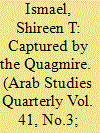

|
|
|
|
|
| Summary/Abstract |
Increasing legibility is now available through NGO and U.N. data, which has been collected across Iraq, for an assessment of the contemporary state of social welfare amongst Iraqi children and the residual effects of the regime change that took place in 2003. This data will be examined, contextualized to the post-2003 period and the potential for theory-building will be explored. The picture that emerges suggests the level of humanitarian catastrophe resulting from the U.S.-led 2003 invasion and occupation recommends further interrogation of the policy of ‘regime change’ for its role in informing U.S. actions. Additionally, such catastrophic humanitarian outcomes lead to questions surrounding future use of regime change efforts. The Iraqi case exhibits the destruction of the state apparatus, with social and cultural institutions built from Iraq's 1932 independence, rather than a direct replacement of those ruling the state. Iraqi children, not yet born when the 2003 invasion took place, have borne the brunt of the Iraqi state's destruction, with an absence of care from those who carried out the change in regime.
|
|
|
|
|
|
|
|
|
|
|
|
|
|
|
|
| 5 |
ID:
107343
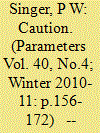

|
|
|
| 6 |
ID:
095499
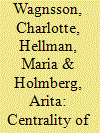

|
|
|
|
|
| Publication |
2010.
|
| Summary/Abstract |
The globalized security situation characterized by transnational threats and international interventionism in "new wars," connect non traditional local actors and traditional global actors to one another in unprecedented ways. We argue that children in particular need to be highlighted because they are highly pertinent to the globalized security situation, yet they make up one of the few agents that have remained non-politicized in the eyes of the scholarly community. The article suggests a framework of analysis that can generate analyses on security of traditional as well as non-traditional agents. Placing non-traditional groups in the center of attention serves to mirror the complexities of the current security situation better.
|
|
|
|
|
|
|
|
|
|
|
|
|
|
|
|
| 7 |
ID:
101771
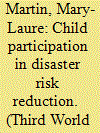

|
|
|
|
|
| Publication |
2010.
|
| Summary/Abstract |
Children are particularly vulnerable to the effects of natural disasters. This article aims to gain a deeper understanding of the specific effects of natural disasters on children and how they could better be involved in the disaster risk reduction (DRR) process. The article begins with a review of the literature published on the Child-led Disaster Risk Reduction (CLDRR) approach and describes the key issues. Then it identifies the effects of floods on children in Bangladesh and analyses the traditional coping mechanisms developed by communities, highlighting where they could be improved. Finally, it analyses how DRR stakeholders involve children in the DRR process and identifies the opportunities and gaps for the mainstreaming of a CLDRR approach in Bangladesh. This should contribute to a better understanding of how key DRR stakeholders can protect children during natural disasters. Encouraging the building of long-term, child-sensitive DRR strategies is an essential part of this process.
|
|
|
|
|
|
|
|
|
|
|
|
|
|
|
|
| 8 |
ID:
084363
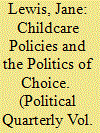

|
|
|
| 9 |
ID:
074283
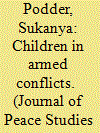

|
|
|
| 10 |
ID:
115207
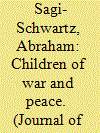

|
|
|
|
|
| Publication |
2012.
|
| Summary/Abstract |
Political conflicts and intractable wars can be conceived as disasters of human activities and they affect the entire life of children and their families. An ecological-transactional perspective of human development is adopted in order to identify multilevel developmental and contextual trajectories that might facilitate or impede the willingness and readiness of people to engage openly and flexibly in conflict-resolution paradigms. It is proposed that building early trustful relationships at the interpersonal level is likely to enhance one's willingness and ability to explore the other side's goals in the conflict, and ultimately to consider reconciliation. At the same time, the absence of such trustful relationships is likely to induce more rigid and one-sided approaches in adulthood. Toward that end, the Palestinian-Israeli conflict serves as the main context of analysis.
|
|
|
|
|
|
|
|
|
|
|
|
|
|
|
|
| 11 |
ID:
165544
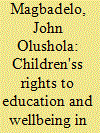

|
|
|
|
|
| Summary/Abstract |
John Olushola Magbadelo presents a critical but objective assessment of the implementation of the Child’s Rights Act of 2003 and relevant provisions in Nigeria’s constitution from the standpoint of the rights of children to education and wellbeing against the backdrop of the policies and programmes adopted by both the federal and state governments, in the context of the country’s mounting economic and social problems.
|
|
|
|
|
|
|
|
|
|
|
|
|
|
|
|
| 12 |
ID:
188946
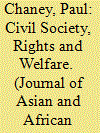

|
|
|
|
|
| Summary/Abstract |
This study examines Cambodia’s implementation of the United Nations Convention on the Rights of the Child (CRC). Corpus analysis of civil society organisations’ submissions to the United Nations Universal Periodic Review reveals a raft of CRC violations, including sexual abuse, trafficking and child labour. This is due to political and bureaucratic failings. The wider significance of this lies in underlining how the disjuncture between state and civil society underpins ongoing violations. Future progress depends on strengthened mobilisation yet increasing repression of civil society makes this unlikely. Accordingly, the prospects are bleak with children in Cambodia continuing to suffer widespread rights violations.
|
|
|
|
|
|
|
|
|
|
|
|
|
|
|
|
| 13 |
ID:
095372
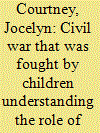

|
|
|
| 14 |
ID:
097862
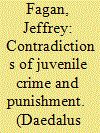

|
|
|
| 15 |
ID:
140445
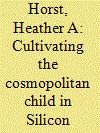

|
|
|
|
|
| Summary/Abstract |
How does cosmopolitanism emerge in regions characterised by diversity and difference? This article examines the ways parents living in Silicon Valley, California seek to realise, maintain and manage ‘cultural and political multiplicities’ in their efforts to create cosmopolitan environments and sociality for their children and families. Grappling with the tension between cultivating academic achievement and cosmopolitan sociability, I explore how parents create opportunities for cosmopolitanism experiences and spaces, moving away from schooling towards education through international travel and philanthropy. The article reflects upon the challenges parents face as they attempt to realise their good intentions, ideas and attitudes to facilitate cosmopolitan sociability in a region where diversity is located in everyday interactions and encounters. I conclude by drawing connections between changing practices and how structural constraints influence parents’ approaches to cultivating cosmopolitanism over time.
|
|
|
|
|
|
|
|
|
|
|
|
|
|
|
|
| 16 |
ID:
120787
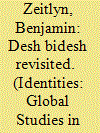

|
|
|
|
|
| Publication |
2013.
|
| Summary/Abstract |
This article discusses the emergence of a 'British Bangladeshi social field'. It makes two connected arguments about its effects. First, it argues that the emergence of the British Bangladeshi social field has rendered the discourses of desh and bidesh less important. Second, it argues that British Bangladeshis are embedded into many transnational social fields and lead multiply orientated rather than binary lives. It uses the example of the importance of the global Islamic umma (community) to British Bangladeshis to illustrate this and argues that it has also contributed to the decreasing importance of the discourse of the desh. What this shows is that the transnationalism of today is very different from that of 20 years ago, both in terms of how it is experienced and how it is analysed.
|
|
|
|
|
|
|
|
|
|
|
|
|
|
|
|
| 17 |
ID:
113279
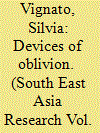

|
|
|
|
|
| Publication |
2012.
|
| Summary/Abstract |
Since the peace agreement has put an end to the 30-year-long civil conflict in the province of Aceh in Indonesia, poverty, parental loss, lack of opportunities and an old tradition have caused a growing number of Acehnese girls and boys to spend between three and ten years in residential Koranic schools [dayah or pesantren]. There, they process their experience of the conflict, be it direct or indirect. In this article, thanks to ethnographical data, the author explores this labour of transformation. An idea of resilience which is culturally based in local societies is analysed. Key issues are the difference between personal and social resilience, plus the transformations that a resilient process enhances in the very culture from which it stems. The dayah have proved very effective structures in facing the needs of the poorest Acehnese children. Nevertheless, the author argues, they tend to shape the children according to a general model that can create exclusion and crystallize pre-existing psychic suffering. This paper indicates that different visions of trauma and memory characterize different parts of the same society, and that selecting one or another is a political choice that is embedded in international policies.
|
|
|
|
|
|
|
|
|
|
|
|
|
|
|
|
| 18 |
ID:
105110
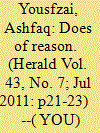

|
|
|
| 19 |
ID:
158206
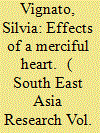

|
|
|
|
|
| Summary/Abstract |
In this article, I examine the relationship of charitable help that, through the persons and the work of caregivers, connects some donors to the young persons who grow up in home-based childcare institutions in contemporary Malaysia. The prism of my analysis is the small charity functions that take place within the homes that I have studied, which allow donors and receivers to elaborate, perfect and enact moral ideas of themselves and of their place in society. Because they stage the main characters of charity, the functions also give an insight into how, since an early age, children actively explore the dominant and largely ethnicized model of virtue and merit they are summoned to embody, thus making sense of their shared condition of “charity children”. This self-care work, I argue, inspired by Erica Bornstein’s study on Indian charity, is made possible by the “pure gift” core that characterizes donors and caretakers, as it frees the aided children from the necessity to “buy” their care back, which is otherwise requested in traditional child fostering.
|
|
|
|
|
|
|
|
|
|
|
|
|
|
|
|
| 20 |
ID:
145151
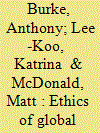

|
|
|
|
|
| Summary/Abstract |
The security agenda is going global. Key threats such as weapons proliferation, disease, terrorism and climate change cannot be addressed unilaterally by states, and require a global perspective to both understand and respond effectively to them. There are therefore powerful pragmatic reasons for embracing a global security perspective. This article, however, suggests that a compelling moral case also exists for viewing security in global terms. National and international security discourses are at odds with the realities of world politics and orient towards the preservation of a status quo that is failing much of the world's population, now and into the future. In this context, this article makes a case for cosmopolitan ethical principles underpinning a global security perspective. Only an ethics that does not discriminate between groups is defensible as a general set of principles. A global security perspective should be underpinned by three cosmopolitan ethical principles which dictate, firstly, that all security actors have responsibility (albeit differentiated) to create security for all; secondly, they should act with consideration of the future implications of their actions in mind; and, thirdly, they should proceed as if their actions will become global over time and space. While not without challenges and dilemmas, such a perspective is urgently needed in contemporary global politics.
|
|
|
|
|
|
|
|
|
|
|
|
|
|
|
|
|
|
|
|
|